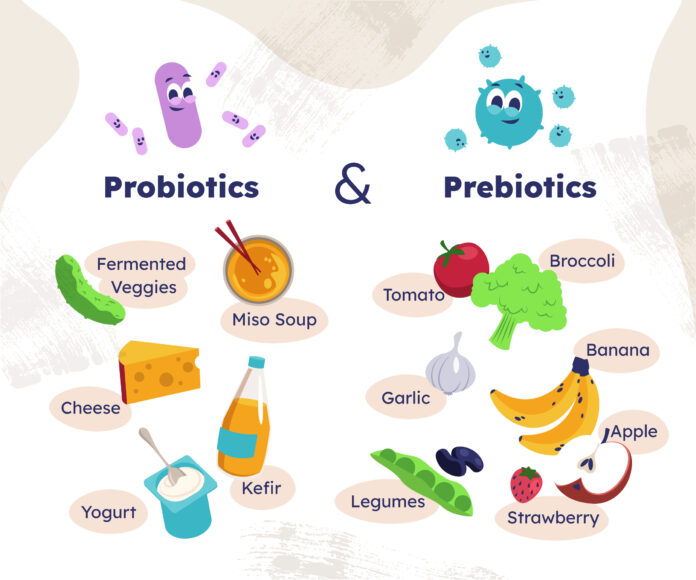Understanding the Microscopic World Within Us
Imagine a bustling city of trillions of inhabitants, all working in harmony to keep you healthy. This isn’t science fiction – it’s happening right now in your gut. The human digestive system hosts an incredible ecosystem of microorganisms, collectively known as the gut microbiome. At the heart of maintaining this complex system are two key players: probiotics and prebiotics.
What Are Probiotics? Meeting Your Microscopic Friends
Probiotics are living microorganisms that provide health benefits when consumed in adequate amounts. Think of them as the “good bacteria” that help maintain balance in your digestive system. According to research published in the Journal of Clinical Gastroenterology, these beneficial bacteria play crucial roles in:
- Digesting food and absorbing nutrients
- Supporting immune system function
- Producing essential vitamins and compounds
- Protecting against harmful bacteria
The most common probiotic strains include Lactobacillus and Bifidobacterium families. A 2022 study in the journal Nutrients found that different strains offer unique benefits, from improving digestive health to enhancing mental wellbeing through the gut-brain axis.
Prebiotics: The Essential Fuel Source
What keeps these beneficial bacteria thriving? Enter prebiotics – the unsung heroes of gut health. Prebiotics are specialized plant fibers that act as food for probiotics. They’re like fertilizer for your internal garden of beneficial bacteria.
Research from the International Scientific Association for Probiotics and Prebiotics (ISAPP) shows that common prebiotic sources include:
- Chicory root
- Jerusalem artichokes
- Garlic
- Onions
- Bananas
- Oats
The Synbiotic Symphony: How Probiotics and Prebiotics Work Together
When probiotics and prebiotics work together, they create what scientists call a “synbiotic” relationship. This partnership enhances the effectiveness of both components. A 2023 review in the journal Frontiers in Microbiology revealed that synbiotic combinations can:
- Improve the survival rate of probiotic bacteria
- Enhance digestive health more effectively than either component alone
- Strengthen the gut barrier function
- Support immune system regulation
Health Benefits: What Does the Science Say?
Digestive Health
Clinical studies have shown impressive results regarding digestive health. A meta-analysis published in the World Journal of Gastroenterology found that probiotic supplementation can reduce symptoms of:
- Irritable Bowel Syndrome (IBS)
- Inflammatory Bowel Disease (IBD)
- Antibiotic-associated diarrhea
- Constipation
Immune System Support
Your gut houses approximately 70% of your immune system. Research from the Journal of Clinical Medicine demonstrates that regular consumption of probiotics and prebiotics can:
- Reduce the frequency and severity of respiratory infections
- Help manage allergic responses
- Support overall immune function
Mental Health Connection
Perhaps most surprisingly, emerging research suggests a strong connection between gut health and mental wellbeing. A groundbreaking study in the journal Nature Neuroscience revealed that the gut microbiome influences:
- Mood regulation
- Stress response
- Anxiety levels
- Cognitive function
How to Incorporate Probiotics and Prebiotics Into Your Diet
Natural Food Sources of Probiotics
- Yogurt with live cultures
- Kefir
- Sauerkraut
- Kimchi
- Kombucha
- Miso
Prebiotic-Rich Foods
- Asparagus
- Leeks
- Green bananas
- Whole grains
- Apples
- Flaxseeds
Common Questions and Expert Answers
How Much Should I Consume Daily?
While individual needs vary, the International Scientific Association for Probiotics and Prebiotics recommends:
- Probiotics: 1-10 billion CFU (Colony Forming Units) per day
- Prebiotics: 3-5 grams daily
Should I Take Supplements?
Consider your diet and health goals. If you struggle to get enough through food sources, high-quality supplements can help. Always consult with a healthcare provider before starting any supplement regimen.
Potential Side Effects and Considerations
While generally safe, some people may experience temporary digestive symptoms when increasing probiotic and prebiotic intake. Start slowly and increase gradually. Those with compromised immune systems should consult healthcare providers before starting supplementation.
The Future of Gut Health Research
Current research is exploring exciting new frontiers:
- Personalized probiotic treatments based on individual microbiome profiles
- Novel prebiotic compounds for targeted health benefits
- The role of the gut microbiome in various health conditions
Making the Right Choice for Your Health
Ready to improve your gut health? Here are actionable steps:
- Start with whole foods rich in both probiotics and prebiotics
- Keep a food diary to track how different foods affect you
- Consider speaking with a healthcare provider about supplementation
- Pay attention to how your body responds to dietary changes
Take Action for Better Gut Health
Understanding probiotics and prebiotics is just the first step. The real benefits come from taking action. Whether through dietary changes or supplementation, supporting your gut health can lead to profound improvements in overall wellbeing.
Want to learn more about optimizing your gut health? Schedule a consultation with a qualified healthcare provider who can create a personalized plan based on your unique needs and health goals.
Remember, your gut health journey is personal, and what works best for you may take some time to discover. Listen to your body, make gradual changes, and celebrate the small victories along the way to better health.
This article is for informational purposes only and should not be considered medical advice. Always consult with a qualified healthcare provider before making significant changes to your diet or starting any new supplement regimen.
































